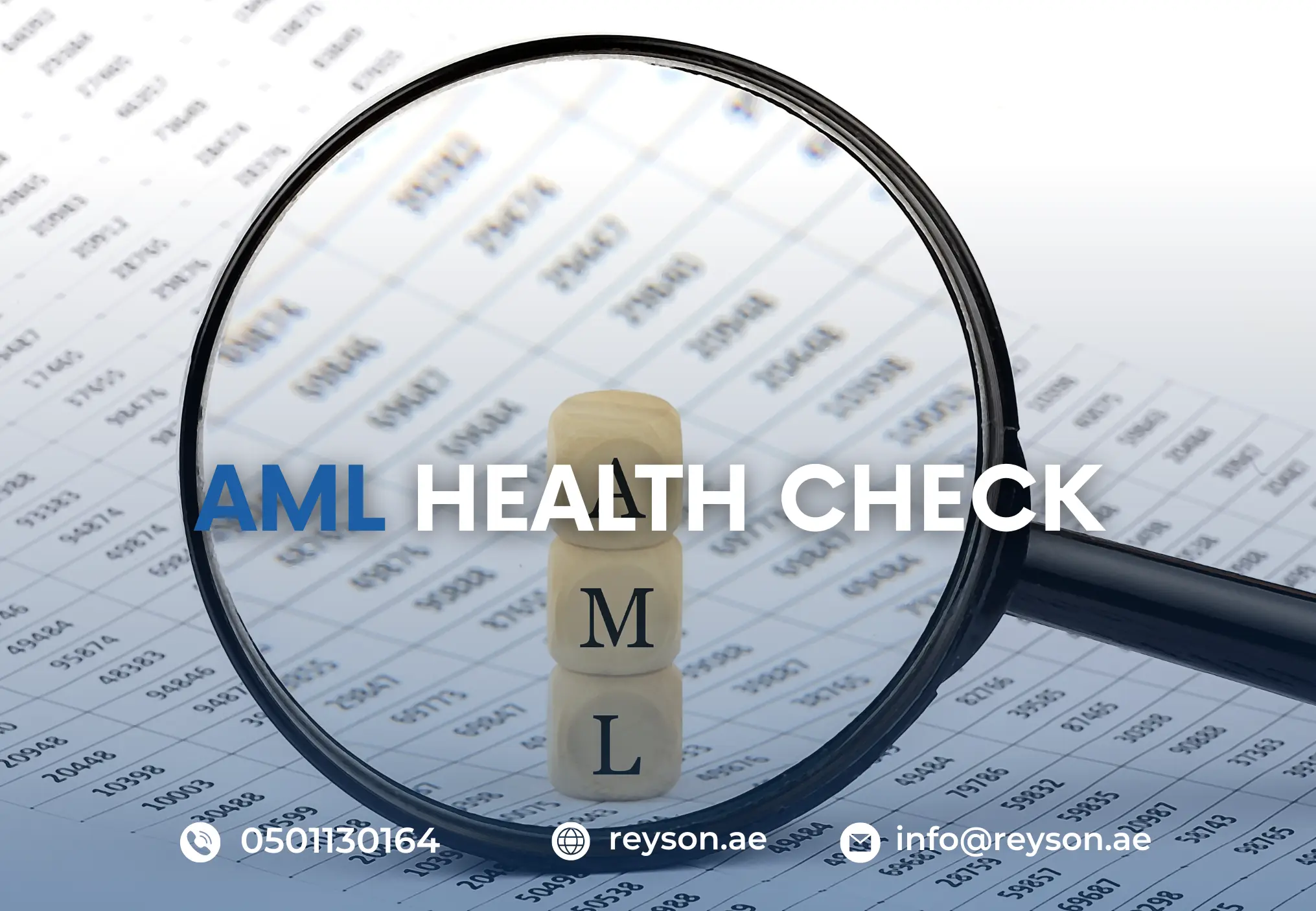Anti-Money Laundering (AML) Health Check
Anti-money laundering (AML) refers to a set of laws, regulations, and procedures designed to prevent criminals from passing off illegally obtained funds as legitimate income. AML laws require financial institutions and other regulated entities to monitor their clients' transactions and report any suspicious activity to relevant authorities. The goal of AML efforts is to detect and prevent the movement of illegal funds that could be used for illegal activities such as drug trafficking, terrorism, and corruption.
In the UAE, AML regulations are of paramount importance due to the country's strategic position as a global financial hub. The UAE has implemented strict AML frameworks to combat money laundering and terrorism financing, aligning with international standards set by organizations such as the Financial Action Task Force (FATF). Compliance with AML regulations is not only a legal requirement but also essential for maintaining the country's reputation, attracting foreign investment, and ensuring the stability and security of its financial sector. Failure to comply with AML laws can result in severe penalties, including fines, imprisonment, and reputational damage.

AML Health Check Services are designed to help organizations in the UAE assess and improve their AML compliance programs. These services involve a comprehensive review of the existing AML policies, procedures, and controls to identify any gaps or deficiencies. The assessment typically includes evaluating customer due diligence processes, transaction monitoring systems, employee training programs, and record-keeping practices. By conducting an AML Health Check, businesses can ensure they meet regulatory requirements, mitigate risks associated with financial crimes, and enhance the overall effectiveness of their AML frameworks. This active approach helps organizations stay ahead of regulatory changes and maintain strong compliance standards.
Objectives of AML Health Check
The primary objectives of an AML Health Check are to ensure regulatory compliance, identify and mitigate AML risks, and enhance the overall effectiveness of an organization's AML framework. By conducting a thorough analysis of current AML practices, an AML Health Check helps organizations align with the strict AML laws in the UAE, thereby avoiding legal penalties and maintaining their reputation.
Key objectives include:
- Assuring compliance with UAE regulations: The primary objective of an AML Health Check is to ensure that an organization's anti-money laundering practices are fully compliant with UAE regulations. This involves a thorough examination of existing policies and procedures to verify compliance to the strict guidelines set by regulatory authorities such as the Central Bank of the UAE and the Ministry of Economy. By ensuring compliance, organizations can avoid penalties and maintain their operational licenses.
- Identifying and Preventing AML risks: An AML Health Check helps in identifying potential risks related to money laundering and terrorist financing within an organization. This process includes a detailed assessment of customer profiles, transaction patterns, and internal controls to pinpoint vulnerabilities. Once identified, customized strategies are developed to mitigate these risks, ensuring that the organization stays ahead of evolving threats and maintains a secure financial environment.
- Improving overall AML framework: Beyond compliance and risk mitigation, an AML Health Check aims to enhance the overall AML framework of an organization. This includes optimizing processes for customer due diligence, transaction monitoring, and reporting. By refining these components, organizations can improve their efficiency and effectiveness in detecting and preventing money laundering activities. Enhancing the AML framework not only boosts regulatory compliance but also strengthens the organization’s reputation and trustworthiness among stakeholders.
By addressing these objectives, an AML Health Check plays a critical role in safeguarding the organization against financial crimes and ensuring long-term stability and compliance.
Components of an AML Health Check
An Anti-Money Laundering (AML) Health Check involves a complete assessment of various components within an organization's AML framework to ensure compliance and effectiveness:
- Detailed Analysis of Current AML Practices: This component involves a thorough examination of the organization's existing AML policies, procedures, and controls. It assesses whether these practices align with regulatory requirements and identifies any weaknesses or imperfections.
- Review of Policies and Procedures: A crucial element involves reviewing and updating AML policies and procedures to reflect current regulations and best practices. This ensures that the organization has clear guidelines for preventing money laundering activities.
- Examination of Customer Due Diligence Processes: Evaluating the effectiveness of customer due diligence (CDD) processes is essential. This includes verifying customer identities, assessing risk levels, and ensuring compliance with KYC (Know Your Customer) requirements.
- Assessment of Transaction Monitoring Systems: Reviewing transaction monitoring systems to detect and report suspicious activities is crucial. It involves evaluating the capability of systems to flag unusual transactions and ensuring timely reporting.
- Evaluation of Employee Training Programs: Assessing the adequacy and effectiveness of AML training programs for employees is vital. This component ensures that staff are well-equipped to recognize suspicious activities, understand their reporting obligations, and follow AML guidelines.
Each of these components contributes to a complete AML Health Check, enabling organizations in the UAE to strengthen their AML compliance frameworks, mitigate risks associated with financial crimes, and maintain regulatory standards.
AML Health Check: Work Process
Conducting an AML Health Check involves a structured process to assess and enhance an organization's Anti-Money Laundering framework:
Steps Involved:
- Preparation: Gather relevant documentation and understand regulatory requirements.
- Risk Assessment: Identify areas where there is a risk of money laundering.
- Evaluation: Assess current AML policies, procedures, and practices.
- Testing: Conduct tests to validate the effectiveness of transaction monitoring and customer due diligence processes.
- Reporting: Compile findings and recommendations for improvement.
Tools and Techniques Used:
- Audit and Assurance Platforms: Utilize specialized software for complete AML assessments.
- Data Analytics: Employ analytics tools to identify patterns indicative of money laundering activities.
- Compliance Checklists: Refer to standardized checklists to ensure adherence to regulatory guidelines.
Key Performance Indicators (KPIs) and Benchmarks:
- AML Compliance Rate: Measure the extent of compliance with AML regulations.
- Suspicious Activity Reporting Rate: Assess the effectiveness of detecting and reporting suspicious activities.
- Training Effectiveness: Evaluate the impact of AML training programs on staff awareness and compliance.
This methodology ensures organizations in the UAE maintain strong AML frameworks, reduce financial crime risks, and comply with regulatory standards.
Benefits of an AML Health Check
- Improved Regulatory Compliance: An AML Health Check ensures that your organization adheres to the latest regulations and guidelines set by regulatory bodies. By regularly assessing your AML processes, you can identify and rectify any compliance gaps, thereby avoiding penalties and legal issues. This active approach helps maintain a strong position of compliance..
- Reduced Risk of Financial Crime: Conducting an AML Health Check helps in identifying vulnerabilities within your AML framework. By addressing these weaknesses, you can significantly reduce the risk of financial crimes such as money laundering and terrorist financing. This ensures that your organization is better protected against illegal activities and fraud.
- Improved Reputation and Trust with Stakeholders: Regular AML Health Checks demonstrate your commitment to preventing financial crimes and complying with laws. This commitment can improve your reputation among clients, investors, and regulatory authorities. Building and maintaining trust with stakeholders is crucial for long term success and business sustainability.
- Streamlined AML Processes: By evaluating and optimizing your AML processes through regular health checks, you can streamline operations and improve efficiency. This not only helps in quicker identification and response to suspicious activities but also reduces the manual workload on your compliance team. Efficient AML processes lead to better resource allocation and overall operational effectiveness.
Regulatory Framework in the UAE
The regulatory framework for Anti-Money Laundering (AML) in the UAE is complete and designed to deal with financial crimes effectively:
Overview of UAE AML Laws and Regulations:
The UAE has established strict AML laws to prevent money laundering and terrorism financing. Key regulations include the Federal Decree-Law No. 20 of 2018 on Anti-Money Laundering and Combating the Financing of Terrorism, and the Cabinet Decision No. 10 of 2019 concerning the Implementing Regulation of the said law. These regulations mandate that businesses implement strong AML policies, conduct customer due diligence, and report suspicious transactions.
Role of Regulatory Authorities:
- Central Bank of UAE (CBUAE): The CBUAE is responsible for supervising financial institutions and ensuring their compliance with AML regulations. It provides guidelines, conducts inspections, and imposes penalties for non compliance.
- Ministry of Economy (MOE): The MOE oversees the implementation of AML regulations across non financial sectors, such as real estate, precious metals trading, and other designated non-financial businesses and professions (DNFBPs). It also provides training and support to these sectors to enhance their AML compliance efforts.
Recent Updates and Changes in AML Regulations:
The UAE continuously updates its AML framework to align with international standards.
Recent changes include:
- Enhanced Customer Due Diligence: Strengthened regulatory requirements for customer verification.
- Beneficial Ownership Disclosure: Increased transparency in disclosing the individuals who ultimately own or control companies.
- Stricter Penalties: Implementation of more severe penalties for non-compliance with AML regulations.
Increased focus on digital transactions and virtual assets to prevent the exploitation of emerging financial technologies for money laundering purposes.
The updated regulatory framework ensures the UAE remains active in its fight against money laundering and terrorism financing, safeguarding the integrity of its financial system.
Choosing the Right AML Health Check Provider
In conclusion, selecting the right AML Health Check provider is crucial for maintaining strong Anti-money laundering controls and ensuring regulatory compliance. A reliable provider should offer complete services that include a detailed analysis of current AML practices, thorough reviews of policies and procedures, and effective customer due diligence processes. They should also provide strong transaction monitoring systems and extensive employee training programs. By choosing a provider with a proven track record and specialized expertise, organizations can significantly reduce the risk of financial crime, improve their reputation with stakeholders, and streamline their AML processes. Reyson Badger, with our extensive experience and commitment to excellence, stands out as a top choice for organizations seeking a dependable partner for their AML health check needs.

